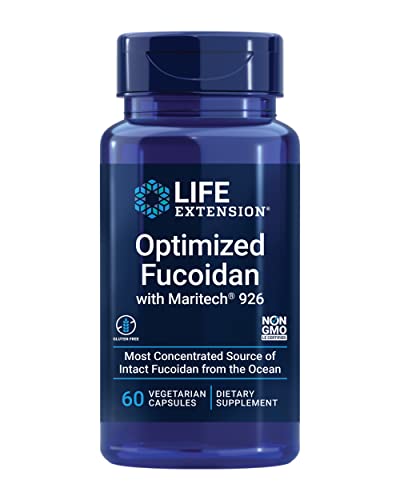Fucoidan for Heart Health: Does It Really Work?
Quick Summary: Research suggests fucoidan, a compound from brown seaweed, might help lower blood pressure and cholesterol, which are important for heart health. However, more studies are needed to confirm these benefits.
What The Research Found
This research review looked at several natural substances and their effects on heart health. It found that fucoidan, which comes from brown seaweed, may have some promising benefits:
- Lower Blood Pressure: Fucoidan might help relax blood vessels, potentially lowering blood pressure.
- Reduce Cholesterol: Studies suggest fucoidan could help lower "bad" LDL cholesterol levels.
- Fight Inflammation: Fucoidan may help reduce inflammation in the body, which is linked to heart disease.
Study Details
This summary is based on a review of existing research, not a single study. It looked at how different natural substances affect heart health.
- Who was studied: The review looked at existing research on humans and animals.
- How long: The review looked at a collection of studies, so the duration varied.
- What they took: The review did not specify the exact dosage of fucoidan used in the studies.
What This Means For You
Fucoidan could be a helpful addition to a heart-healthy lifestyle, but more research is needed.
- Talk to your doctor: Before taking fucoidan supplements, talk to your doctor. They can advise you on the right dosage and potential interactions with other medications.
- Focus on a healthy lifestyle: Remember that fucoidan is not a magic bullet. A healthy diet, regular exercise, and avoiding smoking are still the most important things you can do for your heart.
- Consider it as part of a bigger plan: Fucoidan might be a helpful addition to your heart health routine, but it's not a replacement for proven treatments.
Study Limitations
It's important to keep these things in mind:
- More research is needed: The evidence for fucoidan's benefits is still limited.
- Dosage varies: The best dosage of fucoidan is not yet known.
- Not a cure: Fucoidan is not a cure for heart disease.
Technical Analysis Details
Key Findings
This narrative review synthesizes evidence on fucoidan's cardiovascular benefits, identifying antihypertensive and lipid-lowering effects as primary outcomes. Fucoidan (a sulfated polysaccharide from brown seaweed) demonstrated potential to reduce systolic/diastolic blood pressure and lower total/LDL cholesterol in preclinical and limited human studies cited within the review. Mechanisms highlighted include inhibition of angiotensin-converting enzyme (ACE), modulation of nitric oxide pathways for vascular tone regulation, and suppression of inflammatory markers (e.g., TNF-α, IL-6). The review concludes fucoidan shows promise for cardiovascular disease (CVD) prevention but emphasizes that clinical evidence remains less robust than for other hydrocolloids like psyllium. No quantitative effect sizes or statistical metrics (e.g., p-values) for fucoidan-specific outcomes were reported in the provided summary.
Study Design
This is a non-systematic narrative review published June 1, 2025. The methodology is not detailed in the provided summary, but it synthesizes existing literature on six hydrocolloids (including fucoidan) and other related compounds. As a review, it lacks original sample size, participant demographics, intervention duration, or primary data collection. It aggregates findings from unspecified numbers of preclinical (in vitro, animal) and human studies referenced in the source literature. No systematic search protocol, inclusion/exclusion criteria, or risk-of-bias assessment for cited studies is described in the given summary.
Dosage & Administration
The review does not specify fucoidan dosages, administration routes, or treatment durations from individual studies. It broadly states fucoidan is consumed via dietary supplements or functional foods but provides no quantitative intake ranges (e.g., mg/day), formulation details (e.g., molecular weight variants), or administration protocols (e.g., timing, frequency) used in the studies it references.
Results & Efficacy
The summary reports fucoidan’s qualitative efficacy in improving cardiovascular parameters:
- Antihypertensive effects: Linked to ACE inhibition and endothelial function improvement.
- Lipid-lowering effects: Reductions in total and LDL cholesterol noted.
- Anti-inflammatory actions: Suppression of key cytokines.
No numerical results (e.g., mean BP reduction, % cholesterol change), effect sizes, confidence intervals, or statistical significance (p-values) for fucoidan-specific outcomes are provided in the review summary. Efficacy claims are based on mechanistic and observational data from cited studies, not meta-analyses.
Limitations
Key limitations inherent to this review’s approach include:
1. Non-systematic methodology: Lack of described search strategy increases risk of selection bias and incomplete evidence capture.
2. Heterogeneous evidence base: Combines preclinical data with limited human trials without assessing study quality or consistency.
3. Absence of dose-response analysis: Fails to correlate fucoidan doses with outcomes.
4. No critical appraisal: Does not evaluate biases in cited primary studies (e.g., small sample sizes, short durations).
Future research needs identified include rigorous human randomized controlled trials (RCTs) with standardized fucoidan preparations and long-term CVD endpoint monitoring.
Clinical Relevance
For supplement users, this review suggests fucoidan may support cardiovascular health as part of a broader dietary strategy, but it does not provide actionable dosing guidance or confirm clinical efficacy. Users should note:
- Evidence for fucoidan is less established than for psyllium (which has FDA-approved cholesterol claims).
- Benefits are inferred from mechanistic and preliminary studies; robust human data are lacking.
- Fucoidan supplements vary widely in purity and molecular weight, affecting bioactivity.
Consultation with healthcare providers is essential before using fucoidan for CVD management, especially given potential interactions (e.g., anticoagulant effects). This review primarily informs research directions rather than clinical practice.
Original Study Reference
A review of food hydrocolloids on cardiovascular health: Alginate, astragalus polysaccharides, carrageenan, fucoidan, lunasin, and psyllium.
Source: PubMed
Published: 2025-06-01
📄 Read Full Study (PMID: 40409656)




